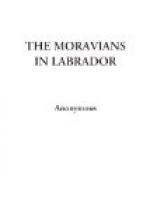Their religion too appears to have received no more improvement than their morals; from their neighbourhood to nominal Christians their creed remained much the same. They believed that Torngak, under the figure of an old man, dwelt in the waters, and had the rule over whales and seals, and that a female demon, Supperguksoak, under the form of an old woman, resided in the interior, and reigned over the land animals. But the Angekoks had assumed a secular power, which they did not possess in Greenland, and exercised at once the office of priest and a chief, of a sorcerer, a thief, and a murderer. Of this several examples will be found in the subsequent narrative, as well as instances of their ridiculous incantations: the females, in some cases, showed the authority and influence of their husbands. Their notions of futurity were gross and sensual, the highest enjoyment of the soul after death, being made to consist in successful hunting and gluttony; the sorest punishment, in poverty and hunger.
The Esquimaux on the east coast of Labrador, may be divided into two sections: those in the south, who seldom come farther than Kangertuksoak, about twenty miles north of Okkak, which lies 57 deg., 20 m. N.L.; and those of the north, who seldom come farther south than Nachrack 59 deg. —m. Saeglak lies between, and in winter is visited by both in their sledges. Those in the north still retain the original native furniture, wooden bowls, and whale-bone water buckets, large and small lamps and kettles of bastard marble, and are more unvitiated, therefore more to be depended upon than the others. They of the south have obtained European pots and kettles of iron, hatchets, saws, knives and gimlets, woollen cloths, sewing needles, and various other utensils of iron; they are more treacherous, and less to be trusted in their dealings.
So long as Newfoundland remained in possession of the French, the traffic of Europeans with the Esquimaux went little farther than the bartering of fish hooks, knives, or trifling wares, which they had brought with them to the fishing for whale fins. But when that Island fell into the hands of the English, they and the Americans, who promised themselves great advantages from opening a trade with the natives, brought with them a more extensive assortment of goods. The




